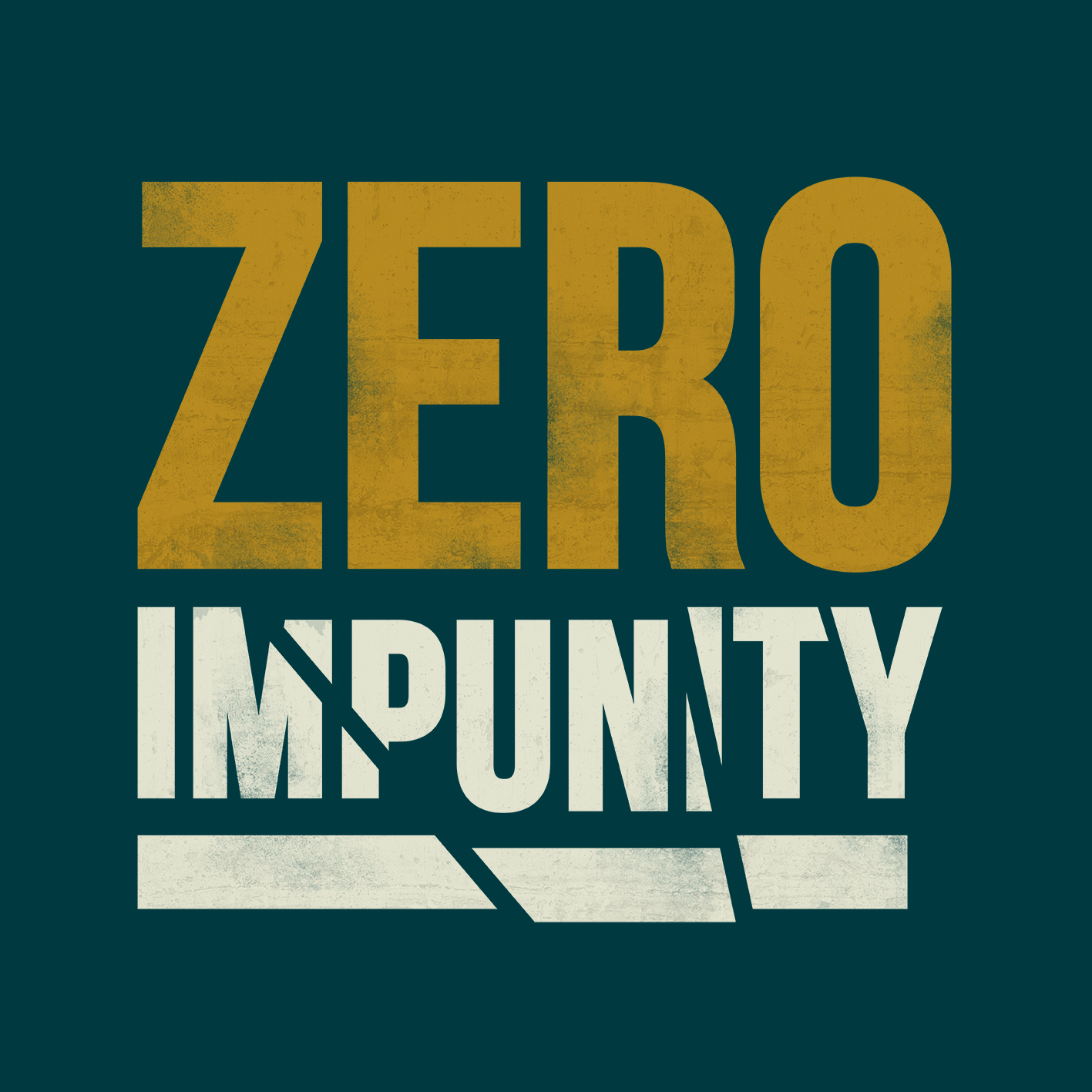Syria
HOW THE ASSAD REGIME
USED CHILD RAPE AS A WEAPON OF WAR
by Cécile Andrzejewski and Leïla Miñano,
with Daham Alasaad

12min

In the six years that war has ravaged Syria, almost every crime imaginable has been committed against its people. They’ve been massacred, tortured, bombed and subjected to chemical weapons. Yet there is another crime, which, until now has been wrapped in a veil of silence: child rape. And yet, in Syrian government prisons, at regime checkpoints and during raids, Assad’s forces are systematically abusing the children of opposition figures in total and utter impunity.
«They took off my clothes!”, the 11-year-old girl screamed. She didn’t seem to know what she was saying as she wandered the streets of her village, located in southern Syria near the city of Daraa. For safety reasons, Fatima did not want the name of her village to be used. As if crazy, the child, Nora, yelled snippets of words, sentences with no beginning or end and repeated again and again: “They took off my clothes! They took off my clothes!”
Nora’s mother, Fatima, stumbled across her daughter by chance when she turned down this street. For the past few hours, she had been frantically searching for her child after hearing a rumor that a group of children who had been detained in a military base might have been released. As soon as she heard, the 35-year-old mother took to the streets, hoping beyond hope to find her missing daughter.
When she finally saw her child, Fatima struggled to recognize the features that she had once known by heart. She moved closer. Nora, in a state of shock, didn’t recognize her.
They had last seen each other only a month and a half before– 45 days to be exact. Yet it was as if an eternity had passed since May 3, 2011. It was the very beginning of Syria’s Arab Spring. All across the country, more and more people were joining protests against the regime of President Bashar al-Assad and the regime was cracking down. The wave of repression was at its bloodiest in Daraa and its surrounding region, the epicenter of the popular uprising.
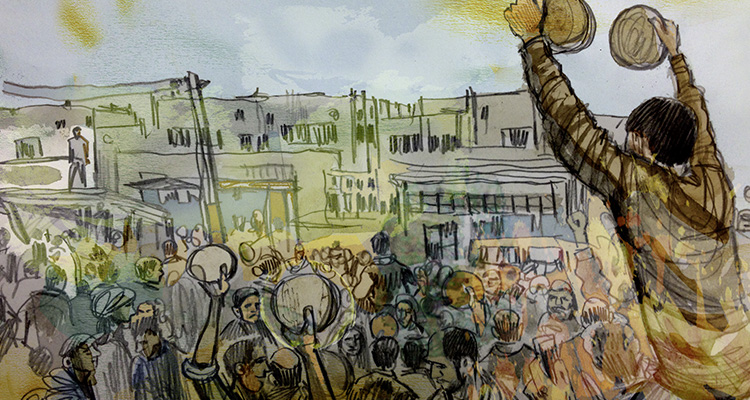
- At the end of February 2011, children from Deraa in southern Syria wrote a slogan to Bashar al-Assad on the wall of their school: “Your turn is coming, Doctor.” They are arrested and tortured. On March 18, four people were killed in the same city during a demonstration. The revolution begins. (© Damien Roudeau – 2017)
In early May 2011, Syrian soldiers and pro-government militias known as the Shabihas had surrounded the town. As helicopters circled over the neighborhoods, soldiers went house-by-house to flush out the protesters they considered “terrorists.”
Karim, Fatima’s husband and Nora’s father, was accused of having helped people who were wounded by bullets fired during the protests. On that particular evening, Karim wasn’t at home. The soldiers ordered Fatima to contact him. She pleaded with them, trying to explain that she and her husband were “practically divorced,” but the soldiers didn’t want to hear any of it.
An officer’s gaze settled on the two children in the room: Nora and her younger brother. Fatima panicked. In an attempt to protect them, she told the officer that they weren’t her children. But terrified Nora cried out, “Mama!”
“We are going to hold your daughter hostage until your husband turns himself in,” the officer announced, grabbing Nora. He and his men hauled her off to a military base in Daraa [the exact location is withheld for security reasons]. The same night, Nora’s father, Karim, turned himself in at the military intelligence agency. Despite this, his daughter would remain a prisoner for the next 45 days. Karim, for his part, would never return.
Fatima told Zero Impunity her daughter’s story one morning in September 2016. The family fled Syria close to four years ago and they now live in an apartment in a poor neighborhood in Amman, the capital of Jordan.
Nora is now a fragile 16-year-old. Her purple abaya, which is dotted with white flowers, doesn’t hide how frail and slight her body is.
Fatima speaks in a low voice, but there is no mistaking her determination to speak out. Many Syrian parents have chosen to remain silent about the violence suffered by their children in an effort to protect them from the shame of the social exclusion that could ensue. Fatima, however, wants people to know about “what Bashar al-Assad did to us”.
With a slow movement, she pulls out several jars of pills from a well-worn handbag.
“Nora takes medicine to help calm her down,” she says gently. “I can’t tell you her story in front of her, or else…”
… or else, she might hurt herself. Nora has already tried to kill herself several times.
Patiently, Fatima recounts the story that her daughter eventually told her.
When Nora arrived at the military base, she realized that she was not the only child there. More than 45 people, mostly women and teenagers, shared her cell. Starting very early in the morning, the prisoners were given pills. The youngest were also given injections. Nora endured regular blows from her jailers. On the 40th day, the jailers told the children to “get ready”. The children thought that the hour of liberation had finally arrived.
Soldiers took Nora from the cell. Soldiers undressed her then brought her into another room. There, a naked “man with grey hair”– the director of the military base– was waiting for her.
It pains Fatima to continue.
“Nora told me, ‘He took me. And he raped me. He slept with me.’ Nora screamed, she tried to flee, she struggled to escape his grasp.”
What happened next is deeply disturbing.
“He then gave her a small yellow pill and gave her a shot in her right arm. He hit her so hard that her head started spinning.”
The next morning, the little girl woke up in an interrogation room. She was covered with blood and several officers were standing around her. Why was there blood there? she wondered. What happened? Nora has no idea what these other men did to her.
“She remembers seeing the man who raped her,” says her mother. “But she has no idea what the others did to her.”
In mid-June 2011, shortly after Nora was assaulted, the soldiers on the base defected en masse. As they left, they helped the children to escape.
Fatima found her daughter wandering around in the street. She immediately took her to the doctor. The practitioner confirmed that Nora had been raped. She also explained that Nora’s vagina was so damaged that she would need an operation.
Medical tests showed that the little girl had also been injected with hormones. For more information, Zero Impunity consulted Agnès Afnaïm, a family doctor at the Primo Levi Centre, a French organization specifically dedicated to the care of victims of torture and political violence. While Afnaïm specified that she didn’t know the doses nor the products administered, she said that a month and a half of hormone injections could have had a real effect on an 11-year-old’s body. Specifically, these injections could have made Nora’s body’s lose its childish shape, before it was offered up to the officers.
Fatima only knows what the doctor told her. Her daughter won’t talk about it.
Après son agression, à la mi-juin 2011, des soldats de la base militaire font défection. En partant, ils aident les enfants à fuir. Fatima retrouve sa fille errant dans les rues. Elle l’emmène chez le médecin. La praticienne lui annonce non seulement que Nora a été violée, mais qu’elle a aussi « de gros problèmes au niveau du vagin », nécessitant une opération.
Par ailleurs, des analyses médicales montrent qu’on a injecté des hormones à la fillette. Selon Agnès Afnaïm, médecin généraliste au centre Primo Levi, spécialisé dans la prise en charge de victimes de tortures et violences, qui précise qu’elle ne connaît ni les doses, ni les produits administrés, ces injections pourraient avoir, en un mois et demi, entrainé des bouleversements physiques chez l’adolescente. Dans quel but ? Certainement pour faire perdre à son corps les dernières traces de l’enfance, avant de l’offrir en pâture aux officiers. Fatima n’aura que la version du médecin. Sa fille refuse d’aborder le sujet.
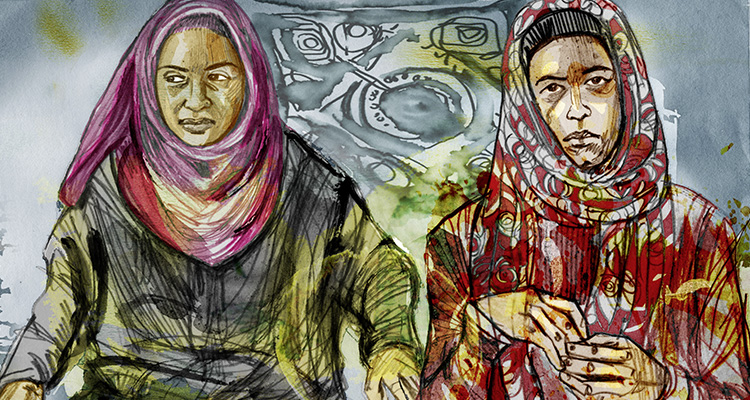
- Five years after the incident, Fatima tells the story of her daughter, Nora, who was raped while she was 11 years old. (© Damien Roudeau – 2017)
It wasn’t until January 2013– a full year and a half after Nora was assaulted that she told her mother what happened to her.
“When we fled to Jordan, Nora cried,” Fatima said. “I thought that she was sad to leave Syria. But she said, “No, I’m happy to leave that place.” I asked her why and she told me everything.”
Five years after the incident, the family is still traumatized. Nora can’t bear to be around any men. Both she and her little brother have received care from a center for orphans in Jordan. One of the coordinators at the center, Loubna, has taken Nora under her wing over the past year.
“When I met Nora, she acted like a woman, not like a little girl,” Loubna remembers. “She said, ‘I know what happens between men and women. And she really knew. How could she know those things?”
While confiding in Loubna, Nora disclosed other details of the assault.
“The prison director told her that she was cute,” Loubna said. “He also took her to see a woman who was being tortured. ‘If you don’t want to suffer like that, you should come with me.’ Nora didn’t know what that meant. She was only 11 years old. She was a child.”
Nora was a child who was drugged, raped and mutilated. Like other underage victims in Syria, Nora was targeted, and then abducted, by the regime because she was the child of man considered to be a “terrorist”.
Because sexual violence against children is the ultimate taboo, it is hard to measure the extent of its role in the Syrian conflict. There have been reports of rape, threats of sexual violence as well as simulations, sexual mutilations and the electrocution of genital organs.
In more than six years of war in Syria, no one knows how many children have fallen victim to violation and abuse, despite the fact that these crimes fall under the “six grave violations” against children during armed conflict (as established by the UN Security Council). Documentation of these crimes remains extremely rare, and are buried in general reports. However, there hasn’t been a single investigation focused entirely on violence against children.
“There is proof that girls and boys scarcely over the age of 12 have experienced sexual violence, including both torture to their genitals and rape,” said international human rights organization Save the Children in its 2013 report Childhood under Fire. Save the Children, “Childhood Under Fire. The impact of two years of conflict in Syria”, March 2013
The NGO Human Rights Watch also mentions sexual violence against children in two more general publications, one about the detention of children Human Rights Watch, “Extreme measures: Abuses against Children Detained as National Security Threats”, July 2016 and the second about sexual assault within Syrian prisons. Human Rights Watch, “Syria: Sexual Assault in Detention”, June 15, 2012 The Office of the United Nations High Commissioner for Human Rights, which documents human rights violations in Syria, has also written several paragraphs about this topic in various reports.
In 2014, in a publication by the UN Secretary General on “children and armed conflict in Syria”, investigators said that the “UN was assembling proof of sexual violence endured by children detained by government forces in both official and secret detention centres”. Report of the Secretary-General on children and armed conflict in the Syrian Arab Republic, January 27, 2014, paragraph 35 UN investigators don’t hesitate to state that “this violence [against children] serves to humiliate, wound, obtain forced confessions or to pressure a parent to turn himself in.”
The Syrian regime has started using sexual violence against children as a weapon in its repressive machine. This very first victim of this weapon was likely a Syrian boy named Hamza El Khatib.
On April 29, 2011, anger and unrest were rumbling across Syria. On that day, 13-year-old Hamza Al Jazeera, “Tortured and killed: Hamza El Khateeb, age 13”, May 31, 2011 was arrested by Syrian authorities during protest in Daraa. This round-faced boy would die in detention. A month after his arrest, Syrian authorities returned his horribly mutilated body to his parents, as if to send a warning to those clamoring for revolution in Daraa. Hamza’s small body bore many signs of torture. Among other things, his penis had been cut off.
This gruesome warning, however, did not play out to its desired effect. Instead, it set the country ablaze. Young Hamza became the first martyr of the Damascus Arab Spring.
To understand the extent to which this violence was systematic, one must to cross the Syrian border into southern Turkey, to an area called Antakya, where many former actors of the state’s repressive machine now live. One of them is Bassam Al Aloulou, 54, a former general in the Syrian army who was once the director of Aleppo’s civilian prison.
Zero Impunity met with him one morning in October 2016. It was the first time that Al Aloulou agreed to speak to journalists about the goings on inside “his” prison.
Since 2012, this general and his family have been living in Apaydin, a Turkish military camp reserved for roughly 5,000 officers who deserted the Syrian army and their families. The camp is tightly controlled and the living conditions there are better than the refugee camps in Jordan and Greece, which overflows with tens of thousands of Syrian refugees who don’t have any special titles or medals.
General Al Aloulou served Assad’s regime for three decades, first as a director of a police academy, then as a prison director in Daraa and Aleppo. The day he deserted– July 18, 2012– is engraved in his memory.
Even in the early hours of the revolution, Aleppo’s civilian prison, which was thought to be less repressive than the detention centers run by the government’s intelligence services and other branches of the military, was overflowing with inmates. Though its capacity was 4,500, it soon had 7,500 inmates on the books.
There were even more prisoners who did not exist officially. These were the prisoners “who we weren’t supposed to ask any questions about”, according to Al Aloulou. Though he had always been a loyal cog in the wheel of Assad’s repressive machine, this long-time military man and civil servant was starting to become fearful… of God.
“I said to myself that I needed to start applying the law because, the day I die, God will punish me.”
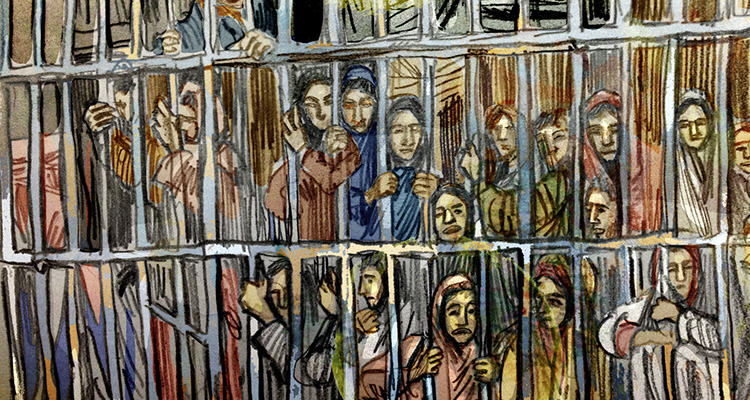
- An overcrowded jail in Aleppo prison. (© Damien Roudeau – 2017)
In order to speak to Zero Impunity, Al Aloulou has permission to leave the camp and travel to Antakya, a city that is about an hour away. He doesn’t go anywhere without bodyguards from a military unit of the Turkish Special Forces to secure his safety.
Al Aloulou, the former general, clings to his Muslim prayer beads, called a misbaha, yet he speaks with the military precision of someone who is used to giving reports.
“When I left, there were about 1,000 minors in the civil prison in Aleppo,” he says. “Most were criminals, but some had been detained to put pressure on their parents. To my knowledge, the youngest was 13 years old.”
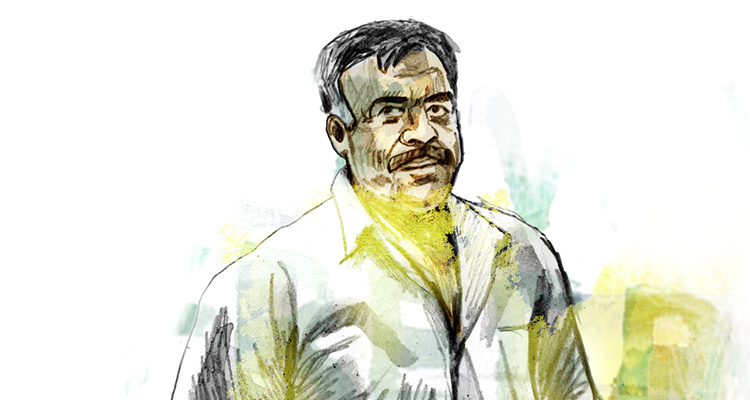
- Bassam Al Aloulou, 54, former director of the civil prison of Aleppo. (© Damien Roudeau – 2017)
Al Aloulou says that, Damascus has had a clear policy on detained children since Spring 2011.
“The Damascus committee [Editor’s note: A body including the highest directors of each branch of security in the Syrian government] ordered us not to differentiate between minors and adults. They told us: ‘Because they are at protests with the adults, we will treat them in the same manner’.”
Minors are no longer kept separately from the other prisoners. Now, they are imprisoned with adults, many of whom are common criminals.
The effects of these orders on child detainees were immediate and devastating.
“The older prisoners started to exploit the younger ones. They forced them to carry out tasks like dishwashing and cleaning… they also raped them,” Al Aloulou said.
Al Aloulou swears that he requested that minors be once again separated from the adults. He also says his request was granted, but it’s impossible to verify this statement.
However, Sema Nassar, an activist who has worked on sexual violence perpetrated against Syrian women, confirmed the complex layers of violence experienced by underage prisoners.
“The violence against children isn’t just carried out by prison guards and torturers, but also by other inmates, especially those who have leadership roles within each cell, who have influence over other prisoners and who take advantage of the children.”
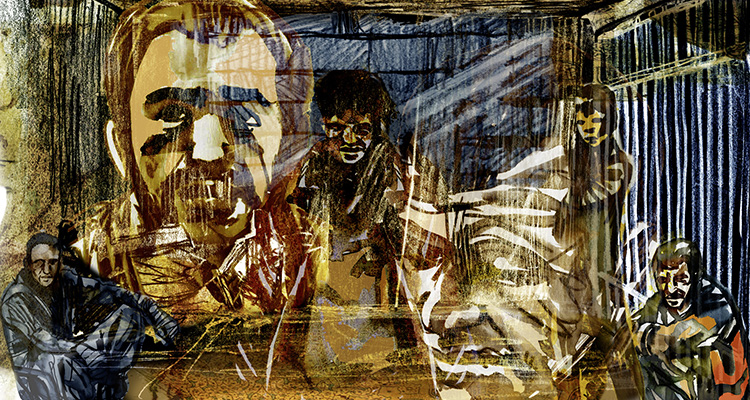
- In August 2016, Amnesty International denounced “crimes against humanity committed by government forces” in the “hell of Syrian prisons”: “an intolerable picture” of violence. (© Damien Roudeau – 2017)
Al Aloulou also admitted that the prison that he ran contained a special cell holding about 30 women and young girls, most of whom were family members of opposition figures, and children “under the age of 13”.
Sometimes, he says, the orders were literally, “Drag this person out of his home. If he isn’t there, you can take anyone– his wife, his daughters. And we’ll keep them until the man who we are looking for turns himself in.”
That’s what happened to Nora, the little girl from Daraa.
However, the sincerity of the remorse expressed by the prison director quickly comes into question. According to an activist media network in Aleppo, Al Aloulou is known for his violent and predatory behavior towards female prisoners and the wives of inmates.
Zero Impunity located a man who served as Al Aloulou’s assistant at the prison. The man, a colonel, has since also deserted. He upheld the activists’ accusations against Al Aloulou.
“He often took sexual advantage of female criminals and the wives of prisoners who came to ask a favor for their imprisoned husbands,” he said.
For the time being, this snippet of information has no more power than an annoying noise. However, if this were to be proven, Al Aloulou could be prosecuted and brought before the international justice system.
Abdelharim Mihbat, 46, could also be arrested one day. It’s almost impossible to believe this lieutenant specialized in military intelligence as he stands there, protesting that he was simply following orders, that he has a “clean conscience” and that he “never did any harm to anyone during his 28 years of service”…
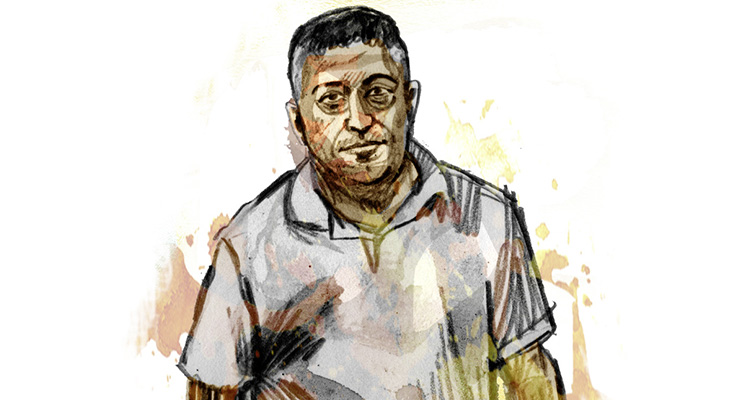
- Abdelharim Mihbat, 46, was mukhabarat: a military intelligence officer. He practiced within the 290 section in Aleppo, a real house of death. (© Damien Roudeau – 2017)
Before deserting five years ago, this non-commissioned officer, who met with Zero Impunity at the same time as Al Aloulou, was a mukhabarat, an officer with the Military Intelligence Directorate. Mihbat worked for the patrols department—called branch 290—which was a veritable house of death, a place where “torturing someone was an activity as banal as drinking some tea.”
When asked if children were tortured as well, Mihbat responded:
“The key words are: ‘you don’t differentiate,’” he said.
Mihbat thinks that the regime had a clear strategy when it decided, at the start of the revolution, to stop differentiating between minors and adults.
“To say that there would be no difference in the treatment of men, women and children was a way to terrorize the population so much that they would stop protesting.”
And so, in the prison where Mihbat worked as well as Al Aloulou’s prison, teenagers who were over the age of 13 were incarcerated with adults. Mihbat said he saw this decision play out in the same way that Al Aloulou did.
“So many rapes took place in the cells,” he said. “Many, every day.”
Did the leaders in Damascus know that mixing children and adults would result in these abuses? Was it done deliberately?
“Yes,” Mihbat said. “This measure was enacted at the same time as the law against terrorism [Editor’s note: which came into force after .” tooltip_text=”Interview with Hannah Mohamad, Free Syrian Lawyer Association”]”
Zero Impunity contacted the Syrian Permanent Mission to the UN multiple times to request an interview, but received no response.
However, in Syria, locking up children is nothing new. It’s actually been a common practice for a long time, “Un œil sur la Syrie, La détention, l’instrumentalisation et la torture des enfants, pratiques courantes dans la Syrie du ‘docteur’ Bachar al-Assad” (2/2), October 22, 2013, http://syrie.blog.lemonde.fr/2013/10/22/la-detention-linstrumentalisation-et-la-torture-des-enfants-pratiques-courantes-dans-la-syrie-du-docteur-bachar-al-assad-22/ (visited website on October 27, 2016) according to the late Wladimir Glassman, a Syrian expert RFI, “Wladimir Glasman, ancien diplomate, auteur du blog «Un oeil sur la Syrie”, December 13, 2012, http://www.rfi.fr/emission/20121213-wladimir-glasman-ancien-diplomate-auteur-blog-oeil-syrie, (visited website on October 27, 2016) and author of the blog “An eye on Syria”, published by French newspaper Le Monde. According to Glassman, an estimated 600 children were held as political prisoners between 1980 and 1983 The Arabic Network for Human rights Information, http://www.anhri.net/syria/shrc/pr040308-2.shtml (visited website on October 27, 2016) for the sole reason that one of their family members was part of the Muslim Brotherhood. At the time, this organization was considered the sworn enemy of Damascus.
“Anyone suspected of being part of this organization was destroyed” both physically and psychologically, according to French journalist Christian Chesnot, the co-author of Les chemins de Damas, a book about Franco-Syrian relations.
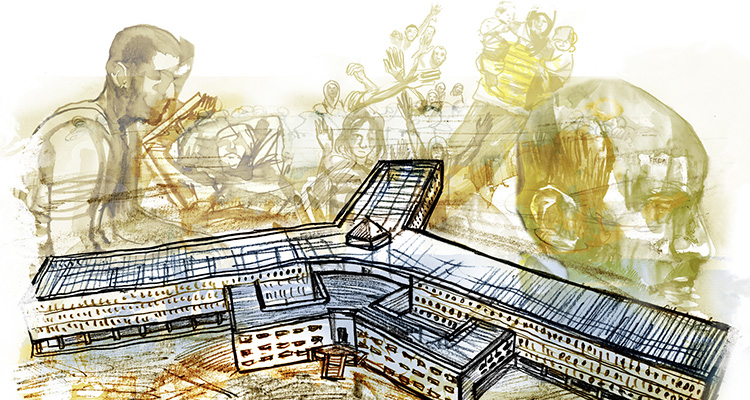
- Amnesty International has rebuilt in 3D the prison of Sednaya, a terrible military prison located 30 kilometers north of Damascus. “The worst place on earth,” according to a former detainee. (© Damien Roudeau – 2017)
Detention centers were not the only place where Syrian children were raped. Children, both boys and girls, became the playthings of the regime all across Syria: at checkpoints, during raids and in their own homes.
Mihbat, the intelligence officer from Aleppo, was part of a unit in charge of arrests and raids in neighborhoods suspected of supporting the rebels.
“At the start of the revolution, the director general of military intelligence, Abdulfatah Homsi, gave orders to our director general. From that moment forward, ‘we had a free hand’. Before, there was at least some oversight. When the revolution started, that was over. There were no more limits.”
According to the former agent, orders to arrest someone were occasionally written down and often given verbally. However, “when it involved real members of the opposition who had participated in the protests”, the mukhabarats had the authorization to “take the family, the wife and the children, if he wasn’t there.”
This is what happened when they carried out an operation in a house in Assoukari, a neighborhood in Aleppo.
“The man wasn’t there, so my colleagues ripped apart his home, threatened his wife and took his three young daughters, who were elementary-school aged,” Mihbat remembered.
Mihbat, who claims that he “just watched” the proceedings, did help throw the girls into a car, which he then drove to the military branch. The three children were taken into an interrogation room. No one knows what happened to these three little girls after that.
Colonel Khaled was on the other side of the struggle– he was part of the Free Syrian Army in Daraa, to be exact.
Khaled once worked for Assad’s side, but he had defected in 2012 and joined the opposition. Starting in the summer of 2014, the walkie-talkies that he and his men used actually picked up the communications of government forces. They listened in for a full year.
“We heard mukhabarats give orders to Shabihas [Editor’s note: pro-government militia groups],” he remembered. “They said: ‘anything you get your hands on belongs to you. You can do what you like with it’. That included rape. They knew that we were listening and they were almost proud of it. They spoke about raping women and all the other damage they were going to do to destroy our morale.”
According to Mihbat, the man behind this is Louay Al-Ali, the head of military intelligence in Daraa.
“Everything in the region is in his hands. It’s his strategy to tell the Shabihas [the militias] to do whatever they want. They are the people who are violent with women and children,” Mihbat said.
The regime targets children in order to terrorize members of the revolution. Other adolescents fall victim to violence simply by being in the wrong place at the wrong time in the chaos of war.
Night has fallen in Amman, the capital of Jordan. A peace has settled across the city and there is a freshness in the air. In his living room, Abdul Hamid Kiwan, a man with a salt-and-pepper beard, serves tea as he waits for his friend Bassam Sharif. These two family men met in prison in Syria. Now, they live in the same neighborhood in the Jordanian capital.
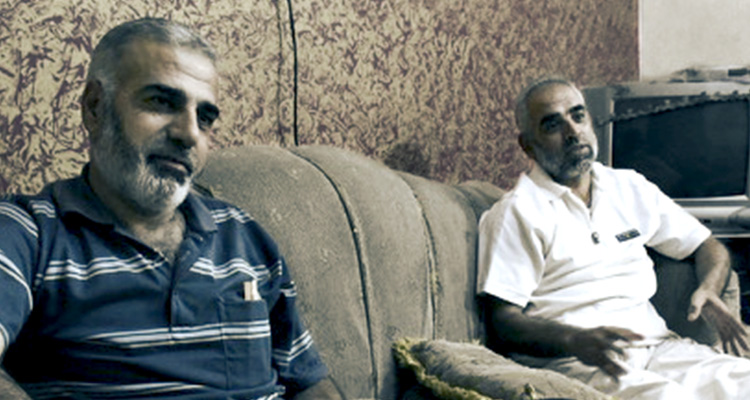
- The pharmacist Abdul Hamid Kiwan (in white) and his friend Bassam Sharif (in blue), former detainees now refugees in Jordan. (© Daham Alasaad – sep. 2016)
“In prison, you hear a lot of stories about children being raped,” Sharif says. He has a yellowish tint from years spent in prison.
When he was first imprisoned in August 2011 by the intelligence unit of the Air Force, Sharif met two 16-year-old boys, Mourad* and Nourredine*, who were captured in a sweep of Deraya, a suburb of Damascus.
“Two handsome boys, mashallah!” Sharif remembered, smiling.
But his face darkens when he speaks of what was done to them.
“They inserted a bottle of Pepsi into Mourad’s… and, for Nourredine, it was some kind of wooden stick.”
How was he so sure the boys were sodomized?
“When they came back to the cell, they couldn’t sit down. So we guessed what had happened to them. Later, they told us, but they had no shame. They didn’t see it as a sexual assault, just classic torture because the interrogators had used objects.”
Perched on the edge of his sofa, Kiwan gives his analysis.
“It’s a method to break society. When former prisoners get together, what we talk about most is the rapes that occurred. Before the revolution, we were used to torture. But not that.”
Sharif goes one step further.
“The sexual violence began when rebels took up arms. It was a way to terrorize people. When the stories of rape started filtering out of the prisons, Syrians started to fear that their children would be raped.”
Close to six years after the conflict began, children continue to be destroyed both physically and psychologically in utter silence and impunity – the result of the free rein given to those who would torture them. Report of the independent international commission of inquiry on the Syrian Arab Republic – February 5, 2013 – annex X paragraph 5 Starting with the first breath of the uprising—when young Hamza El Khatib was tortured and killed— the Syrian government has sought to crush this generation.
That said, in 2012, after a “senior official” complained about this violence against children, the government did take the initiative to have cameras installed in Military Intelligence Branch 235 (known as the “Palestine Branch”), according to Syrian activist Sema Nassar. However, “that didn’t stop the rapes. The perpetrators just stopped committing them in front of the cameras.”
The impunity is such that Syrian refugees often cite fear of rape as one of the “main reasons they decided to flee Syria”. Report of the independent international commission of inquiry on the Syrian Arab Republic - August 13, 2013, paragraph 75
“Raping children? That creates chaos,” says Omar Guerrero, a clinical psychologist at the Primo Levi Centre, which specializes in treatment of victims of torture and political violence.
“We haven’t started thinking about Syria after-the-war. But what are we going to build a society on? What is going to happen to children who were abused? What kind of men and women will they grow up to be? Will they get their dignity back one day?”
Using bombs, torture and rape, has the Syrian regime succeeded in crushing the next generation?
“Children are resilient,” says an aid worker who works with children in conflict zones. “Though we think that the repercussions of this violence will destroy them, they do find a way to get through it”. The young woman remains optimistic. “They are stronger than we think.”
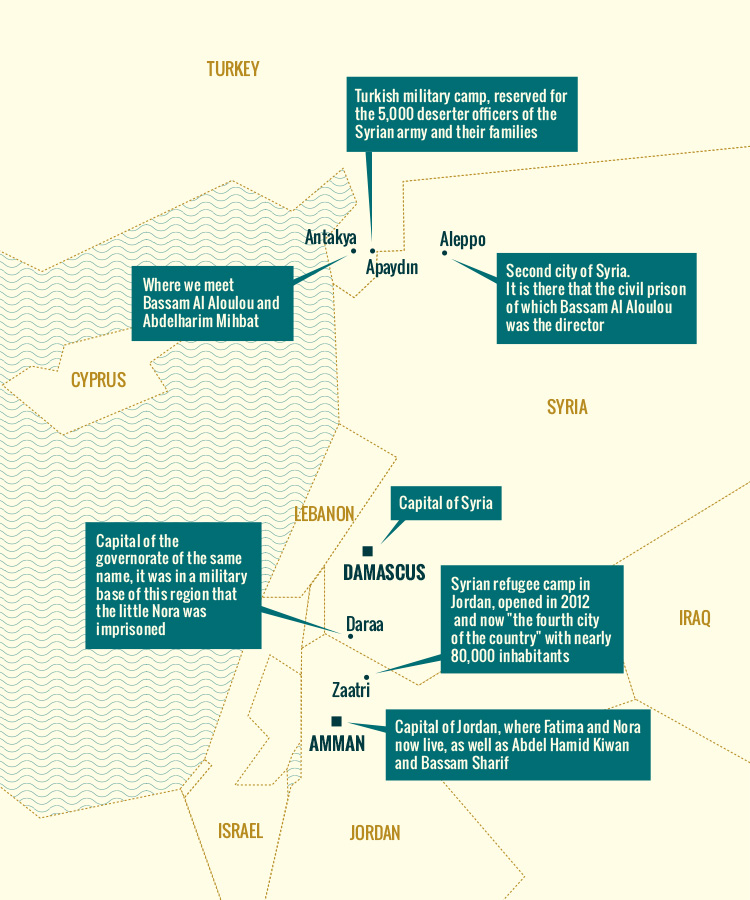
«They took off my clothes!”, the 11-year-old girl screamed. She didn’t seem to know what she was saying as she wandered the streets of her village, located in southern Syria near the city of Daraa. For safety reasons, Fatima did not want the name of her village to be used. As if crazy, the child, Nora, yelled snippets of words, sentences with no beginning or end and repeated again and again: “They took off my clothes! They took off my clothes!”
Nora’s mother, Fatima, stumbled across her daughter by chance when she turned down this street. For the past few hours, she had been frantically searching for her child after hearing a rumor that a group of children who had been detained in a military base might have been released. As soon as she heard, the 35-year-old mother took to the streets, hoping beyond hope to find her missing daughter.
When she finally saw her child, Fatima struggled to recognize the features that she had once known by heart. She moved closer. Nora, in a state of shock, didn’t recognize her.
They had last seen each other only a month and a half before– 45 days to be exact. Yet it was as if an eternity had passed since May 3, 2011. It was the very beginning of Syria’s Arab Spring. All across the country, more and more people were joining protests against the regime of President Bashar al-Assad and the regime was cracking down. The wave of repression was at its bloodiest in Daraa and its surrounding region, the epicenter of the popular uprising.
In early May 2011, Syrian soldiers and pro-government militias known as the Shabihas had surrounded the town. As helicopters circled over the neighborhoods, soldiers went house-by-house to flush out the protesters they considered “terrorists.”
Karim, Fatima’s husband and Nora’s father, was accused of having helped people who were wounded by bullets fired during the protests. On that particular evening, Karim wasn’t at home. The soldiers ordered Fatima to contact him. She pleaded with them, trying to explain that she and her husband were “practically divorced,” but the soldiers didn’t want to hear any of it.
An officer’s gaze settled on the two children in the room: Nora and her younger brother. Fatima panicked. In an attempt to protect them, she told the officer that they weren’t her children. But terrified Nora cried out, “Mama!”
“We are going to hold your daughter hostage until your husband turns himself in,” the officer announced, grabbing Nora. He and his men hauled her off to a military base in Daraa [the exact location is withheld for security reasons]. The same night, Nora’s father, Karim, turned himself in at the military intelligence agency. Despite this, his daughter would remain a prisoner for the next 45 days. Karim, for his part, would never return.
“We are going to hold your daughter hostage until your husband turns himself in”
Fatima told Zero Impunity her daughter’s story one morning in September 2016. The family fled Syria close to four years ago and they now live in an apartment in a poor neighborhood in Amman, the capital of Jordan.
Nora is now a fragile 16-year-old. Her purple abaya, which is dotted with white flowers, doesn’t hide how frail and slight her body is.
Fatima speaks in a low voice, but there is no mistaking her determination to speak out. Many Syrian parents have chosen to remain silent about the violence suffered by their children in an effort to protect them from the shame of the social exclusion that could ensue. Fatima, however, wants people to know about “what Bashar al-Assad did to us”.
With a slow movement, she pulls out several jars of pills from a well-worn handbag.
“Nora takes medicine to help calm her down,” she says gently. “I can’t tell you her story in front of her, or else…”
… or else, she might hurt herself. Nora has already tried to kill herself several times.
Patiently, Fatima recounts the story that her daughter eventually told her.
When Nora arrived at the military base, she realized that she was not the only child there. More than 45 people, mostly women and teenagers, shared her cell. Starting very early in the morning, the prisoners were given pills. The youngest were also given injections. Nora endured regular blows from her jailers. On the 40th day, the jailers told the children to “get ready”. The children thought that the hour of liberation had finally arrived.
Soldiers took Nora from the cell. Soldiers undressed her then brought her into another room. There, a naked “man with grey hair”– the director of the military base– was waiting for her.
It pains Fatima to continue.
“Nora told me, ‘He took me. And he raped me. He slept with me.’ Nora screamed, she tried to flee, she struggled to escape his grasp.”
What happened next is deeply disturbing.
“He then gave her a small yellow pill and gave her a shot in her right arm. He hit her so hard that her head started spinning.”
The next morning, the little girl woke up in an interrogation room. She was covered with blood and several officers were standing around her. Why was there blood there? she wondered. What happened? Nora has no idea what these other men did to her.
“She remembers seeing the man who raped her,” says her mother. “But she has no idea what the others did to her.”

“He then gave her a small yellow pill and gave her a shot in her right arm. He hit her so hard that her head started spinning.”
In mid-June 2011, shortly after Nora was assaulted, the soldiers on the base defected en masse. As they left, they helped the children to escape.
Fatima found her daughter wandering around in the street. She immediately took her to the doctor. The practitioner confirmed that Nora had been raped. She also explained that Nora’s vagina was so damaged that she would need an operation.
Medical tests showed that the little girl had also been injected with hormones. For more information, Zero Impunity consulted Agnès Afnaïm, a family doctor at the Primo Levi Centre, a French organization specifically dedicated to the care of victims of torture and political violence. While Afnaïm specified that she didn’t know the doses nor the products administered, she said that a month and a half of hormone injections could have had a real effect on an 11-year-old’s body. Specifically, these injections could have made Nora’s body’s lose its childish shape, before it was offered up to the officers.
Fatima only knows what the doctor told her. Her daughter won’t talk about it.
It wasn’t until January 2013– a full year and a half after Nora was assaulted that she told her mother what happened to her.
“When we fled to Jordan, Nora cried,” Fatima said. “I thought that she was sad to leave Syria. But she said, “No, I’m happy to leave that place.” I asked her why and she told me everything.”
Five years after the incident, the family is still traumatized. Nora can’t bear to be around any men. Both she and her little brother have received care from a center for orphans in Jordan. One of the coordinators at the center, Loubna, has taken Nora under her wing over the past year.
“When I met Nora, she acted like a woman, not like a little girl,” Loubna remembers. “She said, ‘I know what happens between men and women. And she really knew. How could she know those things?”
While confiding in Loubna, Nora disclosed other details of the assault.
“The prison director told her that she was cute,” Loubna said. “He also took her to see a woman who was being tortured. ‘If you don’t want to suffer like that, you should come with me.’ Nora didn’t know what that meant. She was only 11 years old. She was a child.”
Nora was a child who was drugged, raped and mutilated. Like other underage victims in Syria, Nora was targeted, and then abducted, by the regime because she was the child of man considered to be a “terrorist”.
Because sexual violence against children is the ultimate taboo, it is hard to measure the extent of its role in the Syrian conflict. There have been reports of rape, threats of sexual violence as well as simulations, sexual mutilations and the electrocution of genital organs.
In more than six years of war in Syria, no one knows how many children have fallen victim to violation and abuse, despite the fact that these crimes fall under the “six grave violations” against children during armed conflict (as established by the UN Security Council). Documentation of these crimes remains extremely rare, and are buried in general reports. However, there hasn’t been a single investigation focused entirely on violence against children.

Like other underage victims in Syria, Nora was targeted, and then abducted, by the regime because she was the child of man considered to be a “terrorist”.
“There is proof that girls and boys scarcely over the age of 12 have experienced sexual violence, including both torture to their genitals and rape,” said international human rights organization Save the Children in its 2013 report Childhood under Fire. Save the Children, “Childhood Under Fire. The impact of two years of conflict in Syria”, March 2013
The NGO Human Rights Watch also mentions sexual violence against children in two more general publications, one about the detention of children Human Rights Watch, “Extreme measures: Abuses against Children Detained as National Security Threats”, July 2016 and the second about sexual assault within Syrian prisons. Human Rights Watch, “Syria: Sexual Assault in Detention”, June 15, 2012 The Office of the United Nations High Commissioner for Human Rights, which documents human rights violations in Syria, has also written several paragraphs about this topic in various reports.
In 2014, in a publication by the UN Secretary General on “children and armed conflict in Syria”, investigators said that the “UN was assembling proof of sexual violence endured by children detained by government forces in both official and secret detention centres”. Report of the Secretary-General on children and armed conflict in the Syrian Arab Republic, January 27, 2014, paragraph 35 UN investigators don’t hesitate to state that “this violence [against children] serves to humiliate, wound, obtain forced confessions or to pressure a parent to turn himself in.”
The Syrian regime has started using sexual violence against children as a weapon in its repressive machine. This very first victim of this weapon was likely a Syrian boy named Hamza El Khatib.
On April 29, 2011, anger and unrest were rumbling across Syria. On that day, 13-year-old Hamza Al Jazeera, “Tortured and killed: Hamza El Khateeb, age 13”, May 31, 2011 was arrested by Syrian authorities during protest in Daraa. This round-faced boy would die in detention. A month after his arrest, Syrian authorities returned his horribly mutilated body to his parents, as if to send a warning to those clamoring for revolution in Daraa. Hamza’s small body bore many signs of torture. Among other things, his penis had been cut off.
This gruesome warning, however, did not play out to its desired effect. Instead, it set the country ablaze. Young Hamza became the first martyr of the Damascus Arab Spring.
To understand the extent to which this violence was systematic, one must to cross the Syrian border into southern Turkey, to an area called Antakya, where many former actors of the state’s repressive machine now live. One of them is Bassam Al Aloulou, 54, a former general in the Syrian army who was once the director of Aleppo’s civilian prison.
Zero Impunity met with him one morning in October 2016. It was the first time that Al Aloulou agreed to speak to journalists about the goings on inside “his” prison.
Since 2012, this general and his family have been living in Apaydin, a Turkish military camp reserved for roughly 5,000 officers who deserted the Syrian army and their families. The camp is tightly controlled and the living conditions there are better than the refugee camps in Jordan and Greece, which overflows with tens of thousands of Syrian refugees who don’t have any special titles or medals.
General Al Aloulou served Assad’s regime for three decades, first as a director of a police academy, then as a prison director in Daraa and Aleppo. The day he deserted– July 18, 2012– is engraved in his memory.
Even in the early hours of the revolution, Aleppo’s civilian prison, which was thought to be less repressive than the detention centers run by the government’s intelligence services and other branches of the military, was overflowing with inmates. Though its capacity was 4,500, it soon had 7,500 inmates on the books.
There were even more prisoners who did not exist officially. These were the prisoners “who we weren’t supposed to ask any questions about”, according to Al Aloulou. Though he had always been a loyal cog in the wheel of Assad’s repressive machine, this long-time military man and civil servant was starting to become fearful… of God.
“I said to myself that I needed to start applying the law because, the day I die, God will punish me.”
In order to speak to Zero Impunity, Al Aloulou has permission to leave the camp and travel to Antakya, a city that is about an hour away. He doesn’t go anywhere without bodyguards from a military unit of the Turkish Special Forces to secure his safety.
Al Aloulou, the former general, clings to his Muslim prayer beads, called a misbaha, yet he speaks with the military precision of someone who is used to giving reports.
“When I left, there were about 1,000 minors in the civil prison in Aleppo,” he says. “Most were criminals, but some had been detained to put pressure on their parents. To my knowledge, the youngest was 13 years old.”
Al Aloulou says that, Damascus has had a clear policy on detained children since Spring 2011.
“The Damascus committee [Editor’s note: A body including the highest directors of each branch of security in the Syrian government] ordered us not to differentiate between minors and adults. They told us: ‘Because they are at protests with the adults, we will treat them in the same manner’.”
Minors are no longer kept separately from the other prisoners. Now, they are imprisoned with adults, many of whom are common criminals.
The effects of these orders on child detainees were immediate and devastating.
“The older prisoners started to exploit the younger ones. They forced them to carry out tasks like dishwashing and cleaning… they also raped them,” Al Aloulou said.
Al Aloulou swears that he requested that minors be once again separated from the adults. He also says his request was granted, but it’s impossible to verify this statement.
However, Sema Nassar, an activist who has worked on sexual violence perpetrated against Syrian women, confirmed the complex layers of violence experienced by underage prisoners.
“The violence against children isn’t just carried out by prison guards and torturers, but also by other inmates, especially those who have leadership roles within each cell, who have influence over other prisoners and who take advantage of the children.”
Al Aloulou also admitted that the prison that he ran contained a special cell holding about 30 women and young girls, most of whom were family members of opposition figures, and children “under the age of 13”.
Sometimes, he says, the orders were literally, “Drag this person out of his home. If he isn’t there, you can take anyone– his wife, his daughters. And we’ll keep them until the man who we are looking for turns himself in.”
That’s what happened to Nora, the little girl from Daraa.
However, the sincerity of the remorse expressed by the prison director quickly comes into question. According to an activist media network in Aleppo, Al Aloulou is known for his violent and predatory behavior towards female prisoners and the wives of inmates.
Zero Impunity located a man who served as Al Aloulou’s assistant at the prison. The man, a colonel, has since also deserted. He upheld the activists’ accusations against Al Aloulou.
“He often took sexual advantage of female criminals and the wives of prisoners who came to ask a favor for their imprisoned husbands,” he said.
For the time being, this snippet of information has no more power than an annoying noise. However, if this were to be proven, Al Aloulou could be prosecuted and brought before the international justice system.
Abdelharim Mihbat, 46, could also be arrested one day. It’s almost impossible to believe this lieutenant specialized in military intelligence as he stands there, protesting that he was simply following orders, that he has a “clean conscience” and that he “never did any harm to anyone during his 28 years of service”…
Before deserting five years ago, this non-commissioned officer, who met with Zero Impunity at the same time as Al Aloulou, was a mukhabarat, an officer with the Military Intelligence Directorate. Mihbat worked for the patrols department—called branch 290—which was a veritable house of death, a place where “torturing someone was an activity as banal as drinking some tea.”
When asked if children were tortured as well, Mihbat responded:
“The key words are: ‘you don’t differentiate,’” he said.
Mihbat thinks that the regime had a clear strategy when it decided, at the start of the revolution, to stop differentiating between minors and adults.
“To say that there would be no difference in the treatment of men, women and children was a way to terrorize the population so much that they would stop protesting.”
And so, in the prison where Mihbat worked as well as Al Aloulou’s prison, teenagers who were over the age of 13 were incarcerated with adults. Mihbat said he saw this decision play out in the same way that Al Aloulou did.
“So many rapes took place in the cells,” he said. “Many, every day.”
Did the leaders in Damascus know that mixing children and adults would result in these abuses? Was it done deliberately?
“Yes,” Mihbat said. “This measure was enacted at the same time as the law against terrorism [Editor’s note: which came into force after .” tooltip_text=”Interview with Hannah Mohamad, Free Syrian Lawyer Association”]”
Zero Impunity contacted the Syrian Permanent Mission to the UN multiple times to request an interview, but received no response.
However, in Syria, locking up children is nothing new. It’s actually been a common practice for a long time, “Un œil sur la Syrie, La détention, l’instrumentalisation et la torture des enfants, pratiques courantes dans la Syrie du ‘docteur’ Bachar al-Assad” (2/2), October 22, 2013, http://syrie.blog.lemonde.fr/2013/10/22/la-detention-linstrumentalisation-et-la-torture-des-enfants-pratiques-courantes-dans-la-syrie-du-docteur-bachar-al-assad-22/ (visited website on October 27, 2016) according to the late Wladimir Glassman, a Syrian expert RFI, “Wladimir Glasman, ancien diplomate, auteur du blog «Un oeil sur la Syrie”, December 13, 2012, http://www.rfi.fr/emission/20121213-wladimir-glasman-ancien-diplomate-auteur-blog-oeil-syrie, (visited website on October 27, 2016) and author of the blog “An eye on Syria”, published by French newspaper Le Monde. According to Glassman, an estimated 600 children were held as political prisoners between 1980 and 1983 The Arabic Network for Human rights Information, http://www.anhri.net/syria/shrc/pr040308-2.shtml (visited website on October 27, 2016) for the sole reason that one of their family members was part of the Muslim Brotherhood. At the time, this organization was considered the sworn enemy of Damascus.
“Anyone suspected of being part of this organization was destroyed” both physically and psychologically, according to French journalist Christian Chesnot, the co-author of Les chemins de Damas, a book about Franco-Syrian relations.
Detention centers were not the only place where Syrian children were raped. Children, both boys and girls, became the playthings of the regime all across Syria: at checkpoints, during raids and in their own homes.
Mihbat, the intelligence officer from Aleppo, was part of a unit in charge of arrests and raids in neighborhoods suspected of supporting the rebels.
“At the start of the revolution, the director general of military intelligence, Abdulfatah Homsi, gave orders to our director general. From that moment forward, ‘we had a free hand’. Before, there was at least some oversight. When the revolution started, that was over. There were no more limits.”
According to the former agent, orders to arrest someone were occasionally written down and often given verbally. However, “when it involved real members of the opposition who had participated in the protests”, the mukhabarats had the authorization to “take the family, the wife and the children, if he wasn’t there.”
This is what happened when they carried out an operation in a house in Assoukari, a neighborhood in Aleppo.
“The man wasn’t there, so my colleagues ripped apart his home, threatened his wife and took his three young daughters, who were elementary-school aged,” Mihbat remembered.
Mihbat, who claims that he “just watched” the proceedings, did help throw the girls into a car, which he then drove to the military branch. The three children were taken into an interrogation room. No one knows what happened to these three little girls after that.

“when it involved real members of the opposition who had participated in the protests”, the mukhabarats had the authorization to “take the family, the wife and the children, if he wasn’t there.”
Colonel Khaled was on the other side of the struggle– he was part of the Free Syrian Army in Daraa, to be exact.
Khaled once worked for Assad’s side, but he had defected in 2012 and joined the opposition. Starting in the summer of 2014, the walkie-talkies that he and his men used actually picked up the communications of government forces. They listened in for a full year.
“We heard mukhabarats give orders to Shabihas [Editor’s note: pro-government militia groups],” he remembered. “They said: ‘anything you get your hands on belongs to you. You can do what you like with it’. That included rape. They knew that we were listening and they were almost proud of it. They spoke about raping women and all the other damage they were going to do to destroy our morale.”
According to Mihbat, the man behind this is Louay Al-Ali, the head of military intelligence in Daraa.
“Everything in the region is in his hands. It’s his strategy to tell the Shabihas [the militias] to do whatever they want. They are the people who are violent with women and children,” Mihbat said.
The regime targets children in order to terrorize members of the revolution. Other adolescents fall victim to violence simply by being in the wrong place at the wrong time in the chaos of war.
Night has fallen in Amman, the capital of Jordan. A peace has settled across the city and there is a freshness in the air. In his living room, Abdul Hamid Kiwan, a man with a salt-and-pepper beard, serves tea as he waits for his friend Bassam Sharif. These two family men met in prison in Syria. Now, they live in the same neighborhood in the Jordanian capital.
“In prison, you hear a lot of stories about children being raped,” Sharif says. He has a yellowish tint from years spent in prison.
When he was first imprisoned in August 2011 by the intelligence unit of the Air Force, Sharif met two 16-year-old boys, Mourad* and Nourredine*, who were captured in a sweep of Deraya, a suburb of Damascus.
“Two handsome boys, mashallah!” Sharif remembered, smiling.
But his face darkens when he speaks of what was done to them.
“They inserted a bottle of Pepsi into Mourad’s… and, for Nourredine, it was some kind of wooden stick.”
How was he so sure the boys were sodomized?
“When they came back to the cell, they couldn’t sit down. So we guessed what had happened to them. Later, they told us, but they had no shame. They didn’t see it as a sexual assault, just classic torture because the interrogators had used objects.”
Perched on the edge of his sofa, Kiwan gives his analysis.
“It’s a method to break society. When former prisoners get together, what we talk about most is the rapes that occurred. Before the revolution, we were used to torture. But not that.”
Sharif goes one step further.
“The sexual violence began when rebels took up arms. It was a way to terrorize people. When the stories of rape started filtering out of the prisons, Syrians started to fear that their children would be raped.”
“The sexual violence began when rebels took up arms. It was a way to terrorize people. Syrians started to fear that their children would be raped.”
Close to six years after the conflict began, children continue to be destroyed both physically and psychologically in utter silence and impunity – the result of the free rein given to those who would torture them. Report of the independent international commission of inquiry on the Syrian Arab Republic – February 5, 2013 – annex X paragraph 5 Starting with the first breath of the uprising—when young Hamza El Khatib was tortured and killed— the Syrian government has sought to crush this generation.
That said, in 2012, after a “senior official” complained about this violence against children, the government did take the initiative to have cameras installed in Military Intelligence Branch 235 (known as the “Palestine Branch”), according to Syrian activist Sema Nassar. However, “that didn’t stop the rapes. The perpetrators just stopped committing them in front of the cameras.”
The impunity is such that Syrian refugees often cite fear of rape as one of the “main reasons they decided to flee Syria”. Report of the independent international commission of inquiry on the Syrian Arab Republic - August 13, 2013, paragraph 75
“Raping children? That creates chaos,” says Omar Guerrero, a clinical psychologist at the Primo Levi Centre, which specializes in treatment of victims of torture and political violence.
“We haven’t started thinking about Syria after-the-war. But what are we going to build a society on? What is going to happen to children who were abused? What kind of men and women will they grow up to be? Will they get their dignity back one day?”
Using bombs, torture and rape, has the Syrian regime succeeded in crushing the next generation?
“Children are resilient,” says an aid worker who works with children in conflict zones. “Though we think that the repercussions of this violence will destroy them, they do find a way to get through it”. The young woman remains optimistic. “They are stronger than we think.”
* Names were changed to protect their identity
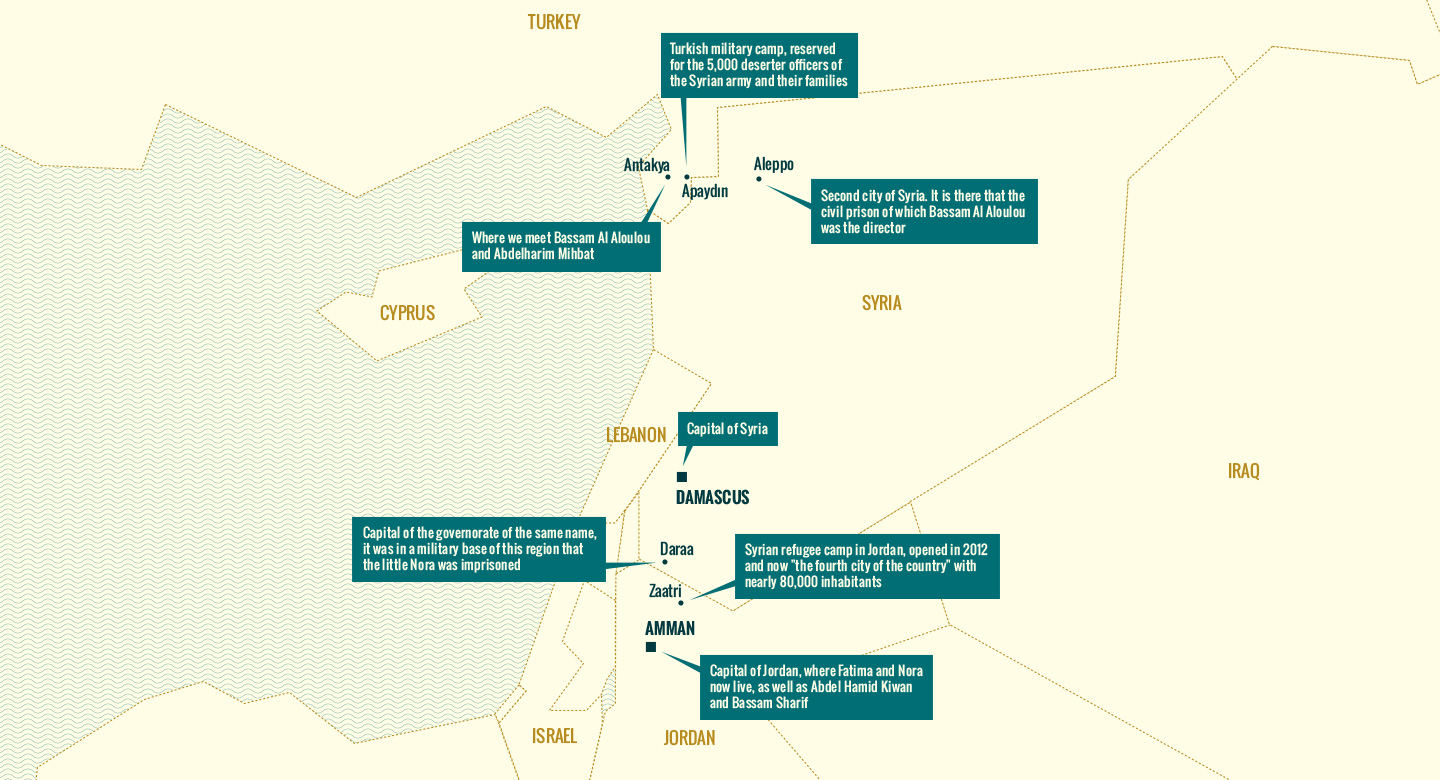
The regime isn’t
the only side to rape
The Syrian regime doesn’t have a monopoly on sexual violence. There was worldwide outcry after word broke about the horror perpetrated against the Yazidi religious minority after they were captured by the Islamic State group. Many women and young girls were forced into sexual slavery.
Moreover, testimonies collected in 2013 by the UN Independent International Commission of Inquiry on the Syrian Arab Republic “suggest that sexual violence has become routine in the operations carried out by security forces”, Report of the independent international commission of inquiry on the Syrian Arab Republic – 05/02/2013 – Annex X - paragraph 34 referring to the anti-government armed forces.
Some people have said that daughters and wives who were victims of sexual violence were married off to fighters from the Free Syria Army after having been raped Report of the independent international commission of inquiry on the Syrian Arab Republic – 05/02/2013 – Annex X - paragraph 35 to try to “end the crisis of sexual violence”. Report of the independent international commission of inquiry on the Syrian Arab Republic – 05/02/2013 – Annex X - paragraph 35 However, aside from the specific case of the Islamic State group, the Commission specified that violations and abuse committed by armed, anti-government groups have not reached the intensity or the scope of those committed by the government forces and affiliated militias.” Report of the independent international commission of inquiry on the Syrian Arab Republic – February 5, 2013 – Summary
The regime isn’t
the only side to rape
The Syrian regime doesn’t have a monopoly on sexual violence. There was worldwide outcry after word broke about the horror perpetrated against the Yazidi religious minority after they were captured by the Islamic State group. Many women and young girls were forced into sexual slavery.
Moreover, testimonies collected in 2013 by the UN Independent International Commission of Inquiry on the Syrian Arab Republic “suggest that sexual violence has become routine in the operations carried out by security forces”, Report of the independent international commission of inquiry on the Syrian Arab Republic – 05/02/2013 – Annex X - paragraph 34 referring to the anti-government armed forces.
Some people have said that daughters and wives who were victims of sexual violence were married off to fighters from the Free Syria Army after having been raped Report of the independent international commission of inquiry on the Syrian Arab Republic – 05/02/2013 – Annex X - paragraph 35 to try to “end the crisis of sexual violence”. Report of the independent international commission of inquiry on the Syrian Arab Republic – 05/02/2013 – Annex X - paragraph 35 However, aside from the specific case of the Islamic State group, the Commission specified that violations and abuse committed by armed, anti-government groups have not reached the intensity or the scope of those committed by the government forces and affiliated militias.” Report of the independent international commission of inquiry on the Syrian Arab Republic – February 5, 2013 – Summary
SHARE
SHARE
LEÏLA MINANO
Leïla Miñano is a journalist, member of the Youpress collective. She covered the Arab Spring on the ground, especially in Syria. She was noticed for a book co-written with Julia Pascal: La guerre invisible, révélations sur les violences sexuelles dans l’armée française (Les Arènes, 2014). She has just published a counter-inquiry into the capture of the city of Palmyra in Syria at Grasset.
CÉCILE ANDRZEJEWSKI
Journalist editor since 2013, Cécile started as a freelance a year later. She collaborates mainly with French magazines (Paris Match, Le Parisien Magazine, Témoignage chrétien, Télérama…), not to mention its northern roots (La Voix du Nord). She has made numerous reports in Bosnia and Herzegovina, India and Cameroon and has recently focused herself on France.
WOULD LIKE TO ACT FOLLOWING THIS INVESTIGATION?
WOULD LIKE TO ACT
FOLLOWING THIS INVESTIGATION?

JOIN THE MOVEMENT
#ZEROIMPUNITY
Be at the side of Nora and all the Syrian children sexually abused by the men of Bashar Al-Assad. Stand with them by signing the petition.
MARCH TO SHOW SUPPORT TO VICTIMS OF SEXUAL VIOLENCE IN THE CURRENT ARMED CONFLICTS.

JOIN THE MOVEMENT
#ZEROIMPUNITY
Be at the side of Nora and all the Syrian children sexually abused by the men of Bashar Al-Assad. Stand with them by signing the petition.
MARCH TO SHOW SUPPORT TO VICTIMS OF SEXUAL VIOLENCE IN THE CURRENT ARMED CONFLICTS.
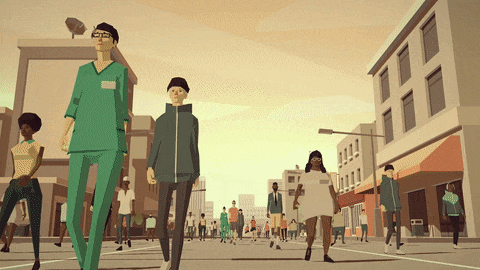
READ ALSO
READ ALSO
Stay Tuned
Follow us
Stay Tuned
Follow us
With the participation of
With the support of




